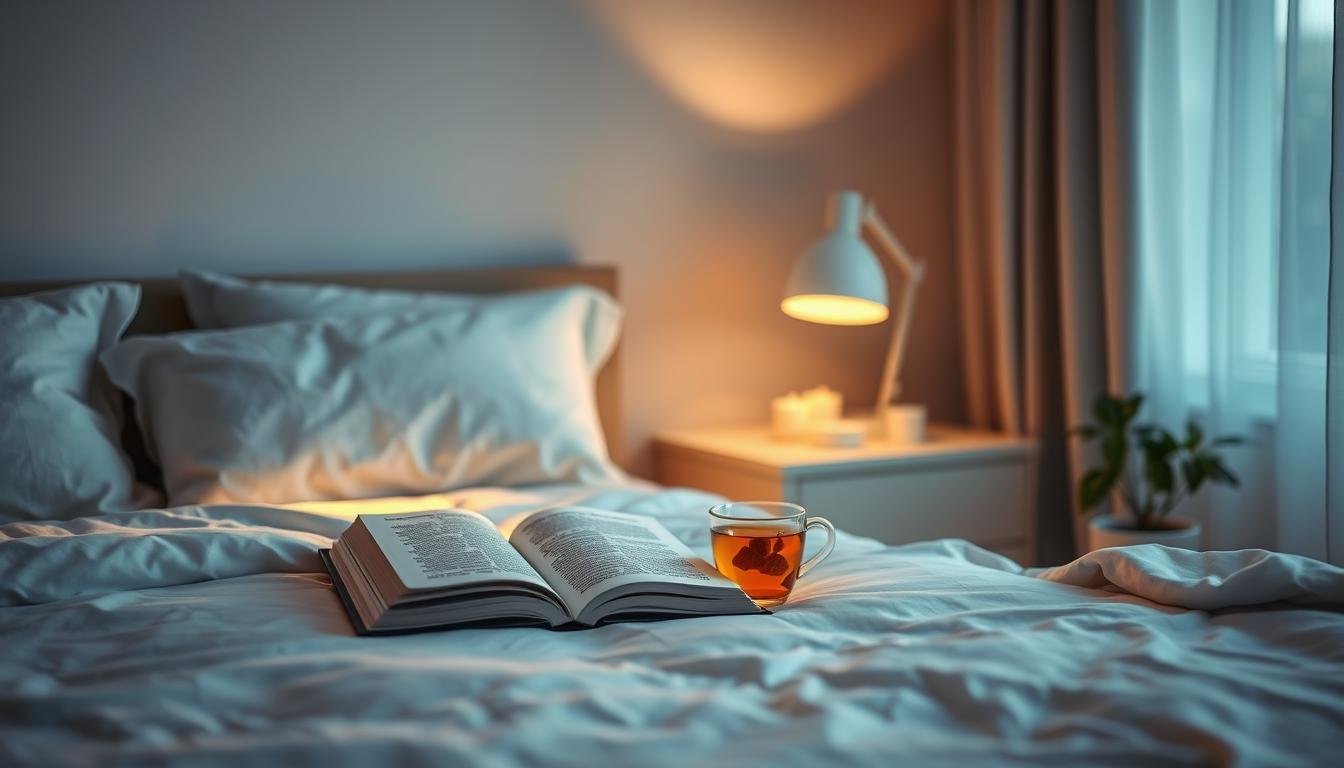Getting enough sleep is key for your health and happiness. But, our fast-paced lives often disrupt our sleep. Sadly, one in three people in the U.S. don’t get enough sleep, which is 33% of adults.
This article will give you a detailed guide to better bedtime routines. These routines can improve your sleep, energy, and brain function. By following these tips, you can make your sleep space better, create calming bedtime rituals, and live a lifestyle that supports good sleep.
Most adults need seven to nine hours of sleep each night, says the American Heart Association. Not getting enough sleep can harm your brain and increase Alzheimer’s risk. It also raises the chance of getting diseases like high blood pressure, heart problems, obesity, and diabetes.
By using the tips in this article, you can create a healthy bedtime routine. This routine can improve your sleep and overall health. From making your sleep space better to using relaxation techniques, this guide will help you find a bedtime routine that fits you.
The Importance of Sleep: Tips for Better Bedtime Routines
Getting quality sleep is key for our health and happiness. The American Heart Association says sleep is vital for heart health. It helps prevent heart disease, stroke, obesity, and depression.
By focusing on sleep, we feel more energetic and sharp. We also live better lives. It’s all about setting up good bedtime habits.
Experts say kids need nine hours of sleep each night. Teens should aim for eight to 10 hours. Adults need at least seven hours for good health.
But, trying to sleep in on weekends doesn’t help. It can lead to weight gain and blood sugar problems.
Insomnia is a common sleep issue. It makes it hard to fall or stay asleep. Fixing sleep problems can help with neurologic disorders and even Alzheimer’s.
Sleep loss hurts our memory, focus, and decision-making. It’s like being drunk. We react slowly, just like someone who’s drunk.
To sleep better, keep a regular schedule and relax before bed. Make your sleep area comfy. Avoid caffeine, alcohol, and screens before bed.
Exercise and relax to sleep well. Good sleep boosts our energy and brain power. It makes life better.
Keeping a regular sleep schedule is vital for our health. Follow these tips for better sleep. Healthy sleep habits lead to a better life.
Establish a Consistent Sleep Schedule
Keeping a regular sleep schedule is key to syncing your body’s circadian rhythm. This internal clock controls when you sleep and wake. Going to bed and waking up at the same time every day, even on weekends, trains your body. It ensures you get enough sleep each night.
Set a Regular Bedtime and Wake Time
Consistency is vital for a healthy sleep routine. Try to go to bed and wake up at the same time daily. This keeps your sleep schedule consistent and improves sleep quality.
Develop a Nighttime Routine
A calming nighttime routine tells your brain it’s time to sleep. Try activities like a warm bath, reading, or light stretching before bed.
Sticking to a sleep schedule boosts your mental and physical health. It also improves performance and stress management. By setting regular times for sleep and having a soothing bedtime routine, you enhance your sleep and well-being.
Create a Sleep-Friendly Environment
Creating a sleep environment that encourages rest is key for better sleep quality. To make your sleep space better, keep the temperature just right and reduce noise levels.
Optimize Temperature and Noise Levels
Try to keep your room cool, between 65-68°F. This temperature is best for sleep, studies show. Also, use blackout curtains or blinds to block out light and make it quiet.
Use Blackout Curtains and Dim Lighting
Choose dim, warm lighting in your bedroom. It helps avoid blue light, which can mess with your sleep. Blackout curtains or blinds also help keep your room dark and peaceful.
By improving your sleep environment, you make a place for better sleep and health. A sleep-friendly space is crucial for getting the rest your body needs.
Avoid Screen Time Before Bed
Using electronic devices like smartphones and TVs before bed can mess up your sleep. This is because they give off blue light. This light stops your body from making melatonin, which is key for sleep.
Experts say to stop using screens 30 minutes to an hour before bed. This helps you sleep better. Doing relaxing things, like reading or listening to music, can also help you relax and sleep well.
To cut down on screen time, try using red lights for reading. Choose books or magazines over screens. You can also use apps to manage screen time and follow a bedtime routine. Reading on a device can make you stay awake longer than reading a real book.
Screen lights can also affect your melatonin levels. So, make your bedroom lights dim 1-2 hours before bed. Avoiding screens and having a calm bedtime routine can improve your sleep and health.
Incorporate Relaxation Techniques
Adding relaxation techniques to your bedtime routine can greatly improve sleep. These practices calm your mind and body, leading to better sleep. Let’s look at some effective ways to relax and sleep well.
Practice Meditation or Deep Breathing
Meditation and deep breathing help reduce stress and anxiety. These are big reasons for sleep problems. Try mindful breathing, like diaphragmatic breathing or the 4-7-8 method, to relax. Visualizations and body scans also help calm you before bed.
Engage in Light Yoga or Stretching
Light yoga or stretching can release tension and prepare your body for sleep. Yoga nidra or progressive muscle relaxation can help you relax. Just remember to keep it light and avoid hard exercises before bed.
Regularly practicing relaxation techniques can greatly improve your sleep. Add these to your bedtime routine and see the positive effects on your sleep and well-being. Always check with a healthcare professional if you have health concerns before starting new practices.
Limit Caffeine and Alcohol Consumption
Keeping a good sleep routine means watching what you drink. Caffeine keeps you awake for hours. Alcohol might make you sleepy at first but can mess up your sleep later.
About 88% of people who drink caffeine in the afternoon have sleep issues. Caffeine stays in your system for 2 to 12 hours. This means it can affect your sleep up to five hours after you drink it.
Drinking alcohol can also hurt your sleep. It can change your sleep cycle, causing insomnia and poor sleep quality. This can harm your physical and mental health over time.
To sleep better, avoid caffeine 8 hours before bed and limit alcohol. These changes can help you sleep more soundly and improve your health.
Establish a Calming Pre-Bed Routine
Creating a calming pre-bed routine can greatly improve your sleep. It tells your brain it’s time to relax, making it easier to fall asleep. Try adding a few simple steps to your evening routine.
Take a Warm Bath or Shower
Starting with a warm bath or shower can be very soothing. It helps your body cool down, which can make you sleepy. You can also add calming essential oils or bath salts to make it even more relaxing.
Read a Book or Listen to Soothing Music
Reading a light book or listening to calming music can relax your mind and body. It helps you get ready for sleep. Stay away from activities like TV or social media, as they can mess up your sleep cycle.
By making a routine that includes a warm bath, reading, and soothing music, you tell your brain it’s time to sleep. Stick to this routine every night to get the best results.
Manage Stress and Anxiety
Stress and anxiety can really mess up your sleep. To fight this, add stress management to your bedtime routine. Try journaling or making a to-do list to clear your mind. This helps you forget about the day and relax.
Practice Journaling or Make a To-Do List
Journaling can be a great way to release stress. It lets you write down your worries and clear your mind. Making a to-do list for tomorrow can also help. It gives you a sense of control and lets you relax before bed.
These simple steps can make a big difference in your sleep. By dealing with your thoughts and planning for tomorrow, you can manage stress better. This leads to a more peaceful and refreshing sleep.
Prioritize Regular Exercise
Adding regular exercise to your day can greatly improve your sleep. It helps set your body’s internal clock right. This clock controls when you sleep and wake up. So, exercising during the day can lead to better sleep at night.
Exercise also cuts down stress and anxiety, which often disrupt sleep. But, be careful when you exercise. Don’t do intense workouts right before bed. The energy boost can make it tough to fall asleep. Try to finish your workout 1-2 hours before bedtime.
- Aim for at least 30 minutes of moderate aerobic exercise, such as brisk walking, cycling, or swimming, which can lead to improved sleep quality the same night.
- Engage in a variety of exercise types, including strength training and flexibility exercises, to optimize the benefits for your sleep and overall health.
- Find an exercise routine that you enjoy, whether it’s running, yoga, or weightlifting, as this will make it easier to stick to a regular exercise habit.
Exercise, sleep, and your body’s internal clock are all connected. Regular physical activity not only improves sleep but also keeps your internal clock healthy. This, in turn, makes your sleep even better.
Avoid Large Meals Before Bedtime
Eating big meals before bed can cause problems like indigestion and acid reflux. It can also lead to midnight trips to the bathroom. This can really mess up your sleep. It’s best to eat up to two hours before bedtime to avoid these issues.
Big meals with lots of fat or carbs close to bedtime can make it harder to fall asleep. But, eating big carbs four hours before bed can help you sleep better. This is because your body has time to digest.
Studies show that eating too close to bedtime can make you wake up more often. Eating two or more hours before bed is better. Most experts say to eat a meal two to four hours before bed to avoid acid reflux and sleep problems.
Having a small, healthy snack before bed is okay. But, eating too much can lead to weight gain. Choose snacks like veggies with hummus, an apple with peanut butter, or Greek yogurt.
Choosing a light snack before bed can improve your sleep and help you stay healthy. Paying attention to your body and adjusting your eating can greatly improve your sleep and health.
Consider Natural Sleep Aids
If you’re still having trouble sleeping, you might want to look into natural sleep aids. Herbal teas and some supplements can help you relax and improve your sleep cycle. But, always talk to your doctor before trying anything new.
Explore Herbal Teas and Supplements
Herbal teas like chamomile or lavender can calm you down and help you sleep better. Supplements like melatonin, valerian root, and magnesium might also help with sleep.
- Melatonin supplements can improve daytime sleep quality and duration, mainly for shift workers.
- Valerian root, in doses of 300-600 mg, may enhance sleep quality and reduce insomnia symptoms.
- Magnesium supplementation can help reduce the time it takes to fall asleep compared to a placebo.
- Lavender aromatherapy has been found to improve sleep quality in older adults and individuals with insomnia.
- Passionflower extract has been associated with significant improvements in total sleep time, sleep efficiency, and wake time after sleep onset in people with insomnia.
Remember, natural sleep aids might not work for everyone and could have side effects. Always check with your healthcare provider before adding any new supplements or herbal teas to your routine.
Seek Professional Help if Needed
If you’re always having trouble sleeping, it’s time to see a healthcare professional. A sleep specialist can check if any health issues or sleep disorders are causing your problems. They will give you advice tailored just for you.
Sleep disorders like sleep apnea and narcolepsy can make you feel tired all day. People with sleep issues often wake up during the night. A sleep specialist can find out why you’re having trouble sleeping and help you fix it.
A sleep specialist will do a detailed check-up, which might include a sleep study. They’ll help you learn good sleep habits and suggest changes in your lifestyle. If needed, they can also prescribe treatments to help you sleep better.
If you’re having trouble sleeping all the time, don’t wait to get help. A sleep specialist can help you find the cause and improve your sleep. They will guide you to better sleep health.
Conclusion
Creating healthy bedtime routines and sleep habits is key to better sleep. By following the tips in this article, you can make your sleep space better. This helps reduce stress and keeps your sleep cycle regular.
Focus on sleep quality, sleep tips, and healthy sleep habits. Doing so can boost your energy, brain function, and overall health.
Getting better sleep might take some time and effort. But, sticking to it can greatly improve your health. Building good bedtime routines helps you feel better every day.
Remember, good sleep is an investment in your future health. Use the tips from this article to manage your sleep. Enjoy the many benefits of a restful night’s sleep.





